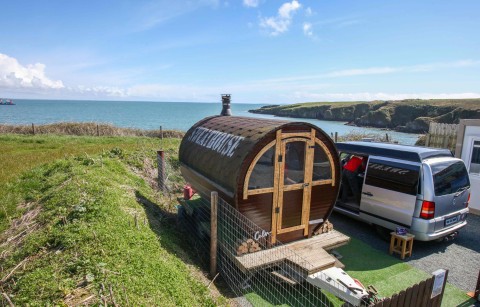
By Peter MURPHY
DUNGARVAN, Ireland (AFP) – For Sharon Fidgeon, a regular visitor to Ireland’s increasingly popular beach saunas, her weekend sessions “have become a healthy addiction” that tap into a centuries-old Irish tradition of toning up by getting sweaty.
On sandy Clonea beach on Ireland’s wind-battered Atlantic coast, the 52-year-old artist told AFP that alternating between the sauna and freezing seawater makes her feel “so incredibly alive”.
“Once you get down in the sea up to your neck, it really sets off the endorphins in your body,” said Fidgeon after a dunk in the two-kilometre-long (1.2 mile-long) bay near Dungarvan in County Waterford.
“And having the sauna here lets me stay in the sea that bit longer,” she said, putting on a dry robe and sandals before briskly stepping into the barrel-shaped structure on wheels above the beach.
In Ireland the Covid-19 pandemic launched a surge in sea-swimming as a bracing escape from lockdowns.
Mobile saunas became a post-Covid “add-on”, according to Deirdre Flavin, who operates several along the Waterford coast, towing them to beaches by car.
“The market is growing and steadily increasing, awareness is spreading, and people are enjoying the experience and coming back for more,” she told AFP as she fired up one of her saunas.
Aside from their health benefits, Flavin, 40, said the cosy boltholes are ideal havens in Ireland’s wild and often wet and chilly weather.
“People can more comfortably sea-swim all-year-round now as they can warm their body cores up after the dip,” she said while packing wooden logs into the sauna’s stove.
– Less alcohol, more wellness –
Further along the southern coast in County Cork, customers at another sauna lauded the activity for stress relief as well as aiding recovery after strenuous sports.
“A lot of the lads in the hurling team would like to get into the water and the sauna, it’s become a thing to do for teams,” said 20-year-old student Rory O’Callaghan, referring to the combative Irish field sport played with sticks.
Sauna owner Bronwyn Connolly suffers from arthritis and when indoor public spaces were shuttered during the pandemic she bought a small barrel sauna and towed it to Garrettstown beach.
“I was struggling a lot with pain, and the sauna and the cold water just eased it, a plunge in the sea after building up a sweat just seems to wash away all the worries,” she told AFP.
As sports teams and corporate groups began showing more interest she set about designing a bigger one, relying on books and YouTube videos for know-how.
With a large window on one side and gently curved tiered seating with a fire, a group sat chatting and marvelling at the view of ocean waves crashing below on the beach.
“It’s really becoming a social thing, where friends or even strangers can meet. Irish people are shifting to less alcohol-driven things and more wellness-driven things,” Connolly told AFP.
Back in 2021 her first mobile sauna was one of the first in the country but now “they are on every beach in Cork”, she said.
– ‘Sweathouse’ –
According to the new wave of operators, the trend harks back to an ancient Irish sauna culture dating from the 1600s that went out of fashion early in the last century: the “sweathouse”.
Remains of hundreds of sweathouses — igloo-shaped stone structures heated by turf fires and used for sweating out colds and fevers, and battling rheumatism and arthritic pain — are dotted around the Irish countryside.
Yoga instructor Carol Ni Stasaigh and her husband Dara Kissane, an exercise physiologist, called their sea sauna on the County Wexford coast “Sweathouse” in a nod to the old ways.
“In ancient times people would have gone in for medicinal, religious purposes, or even hallucinogenic reasons,” Ni Stasaigh told AFP on Baginbun beach.
“We don’t guarantee any hallucinogenic things in our sauna, just hot and cold therapy and the release of endorphins,” she laughed.
Back in Waterford, towelling down at the end of her session, Sharon Fidgeon told AFP the link to the past was an important element of her sauna bathing experience.
“It’s an old Irish tradition. It’s really lovely to be part of something that is old and Irish. It’s magical and quite close to my heart,” she said.








